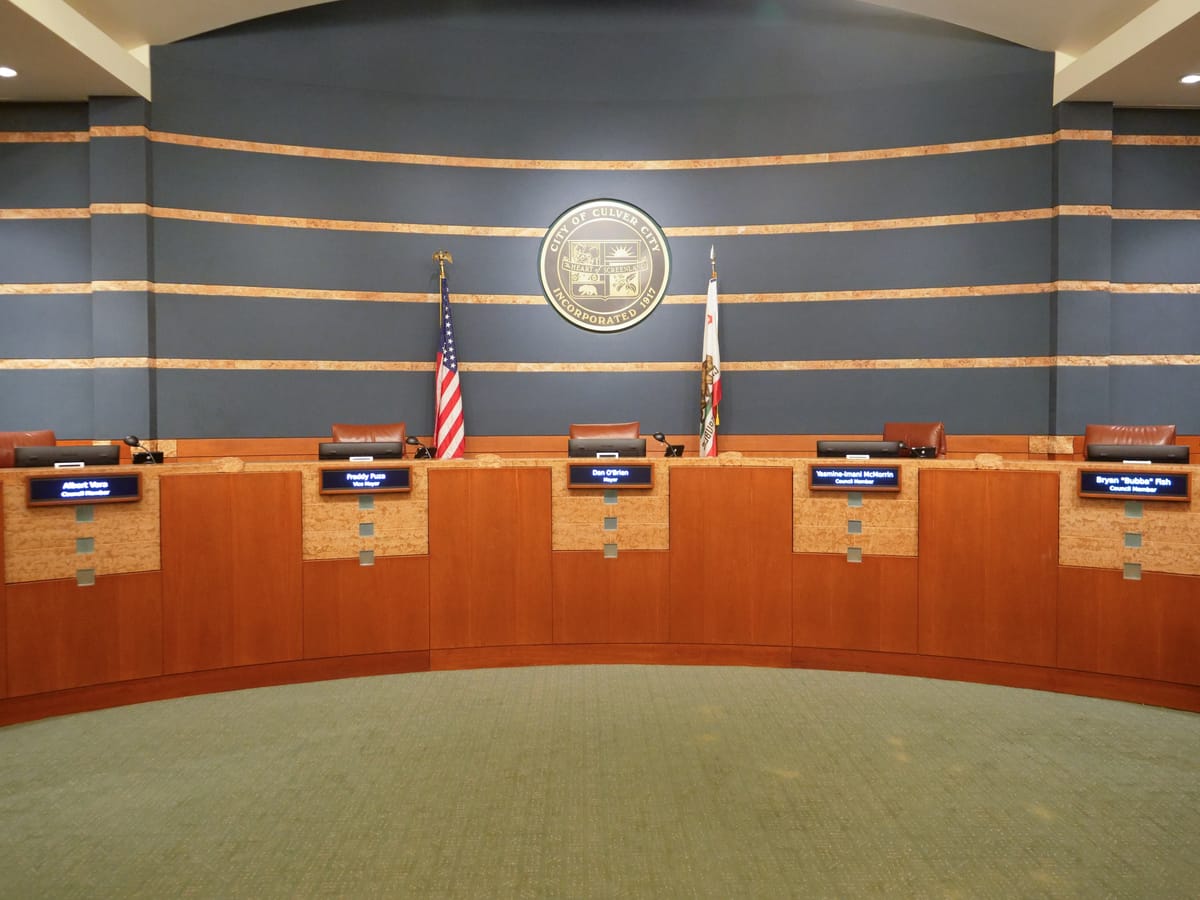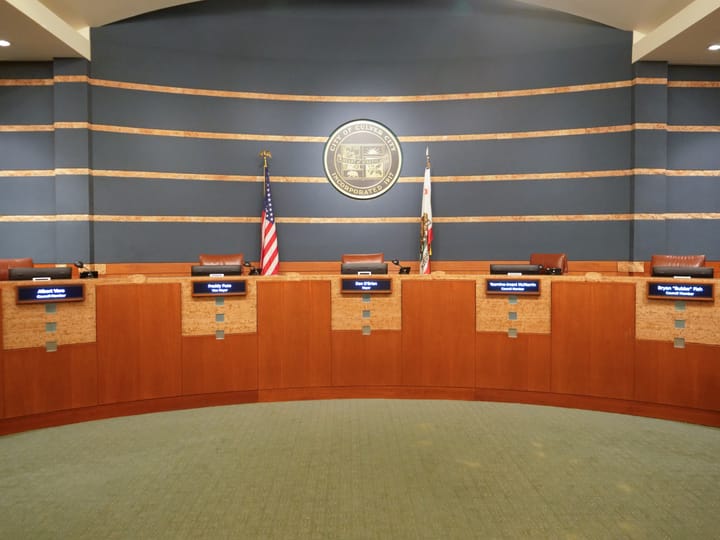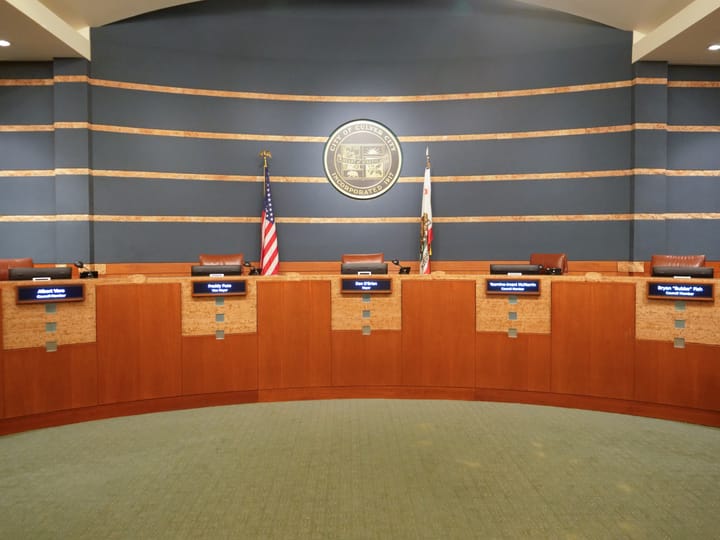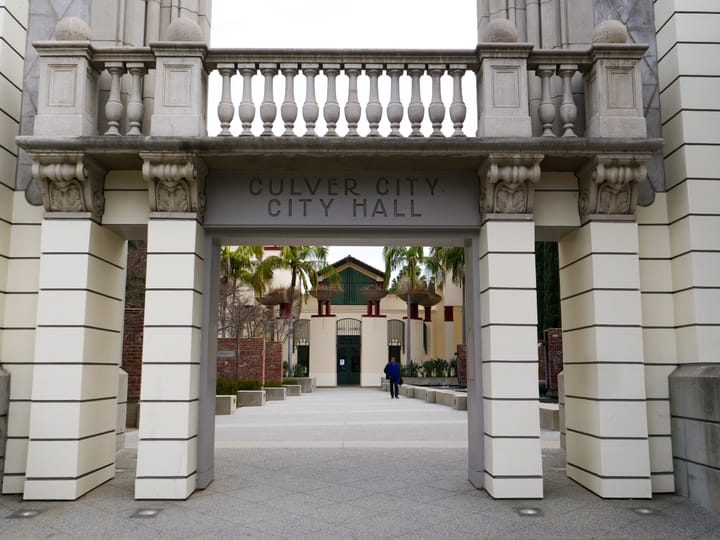City Council prepares response to ICE activity
A special meeting will be held on Wednesday, July 9 to potentially approve several actions to support the community and families impacted by ICE.

In response to recent incidents in which people were abruptly detained by the United States Immigration and Customs Enforcement Agency (ICE) in the city, Culver City's city council held a special meeting Monday and agendized several potential actions to be formally considered at another special meeting set for Wednesday, July 9.
While the city council did not take official action at Monday's meeting, the stage was set for major topics to be evaluated at both the special meeting next week and the next regularly scheduled meeting on July 14. The actions which will be discussed next Wednesday are considerations to pause or discontinue the use of license plate readers, provide financial assistance, and reevaluate police policies.
The original intent of Monday's meeting was to clarify the city's position on recent immigration enforcement activities, using a statement from Huntington Beach as a model. There have been several recent incidents of ICE detaining people on Culver City streets, which have shaken the community and prompted calls to action.
However, once it was made known that the resolution did not alter any policies or procedures within the Culver City Police Department or any other city entity, the council decided to instead consider more tangible actions in response to the recent unrest, which was illustrated by the more than 40 speakers who came to Monday's meeting to share their concerns.
"People are hungry for action at this point," councilmember Bubba Fish said at Monday's special meeting, "and I think we saw that from our community today."
A wide variety of suggestions were put forward by both the city council and members of the public, some of which aimed to bolster funding for family support. McMorrin wrote in an Instagram post hours before Monday's meeting and restated her support for considering modifying or canceling the funding for the Culver City Downtown Business Association's Independence Day Drone Light Show on July 5 to direct "Know Your Rights" training or other community support efforts at the meeting itself.
Other nearby cities — including Boyle Heights, El Sereno, Lincoln Heights, and Northeast Los Angeles — are canceling or postponing their events out of an abundance of caution for the well-being of their residents. The city council approved a $30,000 special event grant last year for Culver City's show, but more than $20,000 is being charged back in fees, police, and fire costs, according to Downtown Business Association Executive Director Darrel Menthe.
"Despite the price tag, we do this on a shoestring," Menthe wrote in a Facebook post asking for community support to protect the event. "I am so proud of this event we are able to do for the community."
Skies above Culver City's downtown area will light up as planned on Saturday, as the remaining council members did not elect to push to consider changes to the Independence Day Event. Instead, staff will explore the potential of establishing a fund to support a nonprofit that helps immigrants in need affected by ICE's activity in Culver City, which will be one of the topics presented at the special meeting on July 9.
The most widely supported action the council will consider is a pause or cessation of the use of Automated License Plate Readers (ALPR). A CalMatters story revealed that despite Senate Bill 34 prohibiting departments from sharing ALPR and other license plate reading data with out-of-state or federal entities, over 100 incidents between the Los Angeles Police Department and sheriff's departments in San Diego and Orange County searching ALPR data and providing information to federal agents in May were uncovered by anti-surveillance group Oakland Matters.
This revelation prompted the community to speak out against the technology at Monday's meeting. With councilmember Albert Vera being absent from the meeting, a 3-1 council majority was in favor of placing a moratorium on the use of the cameras until the council found a long-term solution.
However, the decision-making power related to the cameras ultimately rested on Culver City Police Chief Jason Sims until an item could be placed on an agenda and approved by the council. Sims explained at the meeting that recent changes to the policy regarding ALPR were sufficient to make him feel comfortable continuing to use the technology.
"I understand and hear the concern," Sims said of the use of ALPR, "but I think it's also important to recognize they are a very valuable tool in assisting our police officers and our investigators in preventing and solving crime."
During yesterday's meeting, the Culver City Police Department posted a community update on social media which explained this change.
"CCPD has temporarily suspended our sharing of ALPR data with law enforcement agencies outside of Los Angeles County while we reassess data sharing policies," the statement read. "The department has reached out to the [California] Department of Justice to explore any opportunity to enhance policies and practices."
CCPD's involvement in a countywide mutual aid agreement between police departments that resulted in the Department receiving a request to assist LAPD officers in quelling police brutality protests in early June will also be discussed at next week's special meeting. Councilmember Yasmine-Imani McMorrin argued that Culver City should not provide this type of assistance and wanted to expedite consideration of the matter in response to community concerns.
"I hope that we have talented staff that would be able to guide us in...[ensuring] that we are living out our sanctuary city policies and are not supporting mutual aid requests that contribute to any federal actions," McMorrin said. "That [does not align] with the values of Culver City, and I don't believe that CCPD should be supporting that."
A third action that will be considered at the special meeting next Wednesday is the conversion of the Ad Hoc 2025 Police Policies Subcommittee into a Standing Subcommittee. While meetings for Ad Hoc subcommittees are not open to the public and pertain to matters within specific timeframes, standing subcommittees are designed to address ongoing issues and hold public meetings.
When it came time to approve the roadmap for the special meeting, Mayor O'Brien cast the dissenting vote, but not because he was averse to the ideas themselves. His issue was related to the timing of the meeting, arguing that staff should be given more time to compile the information needed to facilitate the discussion.
O'Brien's concern was driven not only by the volume of requests but by a lack of staffing. City Manager John Nachbar explained that this week was a vacation week for city staff, so many of the figures typically needed to work on these reports are currently out of town. Sims said that his Department would need more than a week to prepare the information for the two police-related items.
"The people I am going to try to be working with to gather information on these items are going to be out of town as well," Sims said. "There is no way we could do this on Monday [the 7th]."
This staff shortage related to vacations caused the council to push another key ask from residents on Monday — consideration of a rental assistance or eviction moratorium for families impacted by ICE — to the regularly scheduled July 14 meeting due to the lack of Housing and Human Services Department staff available to provide feedback on the Department's readiness at Monday's meeting.
However, the urgency of the moment pushed three council members to approve the plan as structured. McMorrin pointed to the suffering and fear experienced by those in the community as an impetus to make the necessary sacrifices to consider these items with the level of urgency required to help people at the moment.
"I know it is asking a lot of us," McMorrin said. "I really appreciate the hard work that has happened and that will move forward, knowing it will have such meaningful impacts for people directly [harmed] by this cruelty."




Comments ()